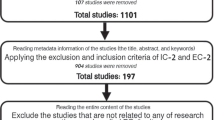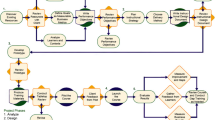Abstract
Fatigue is a common problem faced by cancer patients and survivors, yet is often overlooked. An online fatigue class is evaluated using measures based on the Health Belief Model (HBM). A sample of 26 survivors and seven caregivers completed pre-class and post-class surveys and a facilitated discussion. Statistically significant improvements were detected in both the fatigue knowledge (p < 0.001) and belief (p < 0.001) scores. Participants reported that the content was accessible and useful. The class had a positive impact on their knowledge and beliefs about cancer fatigue. This suggests that HBM may be an appropriate framework for the evaluation of Internet-based educational interventions.
Similar content being viewed by others
References
American Cancer Society (2007) Cancer facts and figures, 2007. American Cancer Society, Atlanta
Manfredi C, Czaja R, Price J et al (1993) Cancer patients’ search for information. J Natl Cancer Inst Monogr 14:93–104
Roberts KJ, Lepore SJ, Urken ML (2008) Quality of life after thyroid cancer: an assessment of patient needs and preferences for information and support. J Cancer Educ 23:186–191
Mayer DK, Terrin NC, Kreps GL et al (2006) Cancer survivors information seeking behaviors: a comparison of survivors who do and do not seek information about cancer. Patient Educ Couns 65:342–350
Sutherland G, Dpsych LH, White V et al (2008) How does a cancer education program impact on people with cancer and their family and friends? J Cancer Educ 23:126–132
Eysenbach G (2003) The impact of the Internet on cancer outcomes. CA Cancer J Clin 53:356–371
Hesse BW, Nelson DE, Kreps GL et al (2005) Trust and sources of health information: the impact of the Internet and its implications for health care providers: findings from the first Health Information National Trends Survey. Arch Intern Med 165:2618–2624
Cella D, Peterman A, Passik S et al (1998) Progress toward guidelines for the management of fatigue. Oncology (Williston Park) 12:369–377
Stasi R, Abriani L, Beccaglia P et al (2003) Cancer-related fatigue: evolving concepts in evaluation and treatment. Cancer 98:1786–1801
Cella D, Davis K, Breitbart W et al (2001) Cancer-related fatigue: prevalence of proposed diagnostic criteria in a United States sample of cancer survivors. J Clin Oncol 19:3385–3391
Bower JE (2005) Prevalence and causes of fatigue after cancer treatment: the next generation of research. J Clin Oncol 23:8280–8282
Passik SD, Kirsh KL, Donaghy K et al (2002) Patient-related barriers to fatigue communication: initial validation of the fatigue management barriers questionnaire. J Pain Symptom Manage 24:481–493
Vogelzang NJ, Breitbart W, Cella D et al (1997) Patient, caregiver, and oncologist perceptions of cancer-related fatigue: results of a tripart assessment survey. The Fatigue Coalition. Semin Hematol 34:4–12
Lipman AJ, Lawrence DP (2004) The management of fatigue in cancer patients. Oncology (Williston Park) 18:1527–1535
Morrow GR, Shelke AR, Roscoe JA et al (2005) Management of cancer-related fatigue. Cancer Invest 23:229–239
Mock V (2004) Evidence-based treatment for cancer-related fatigue. J Natl Cancer Inst Monogr (32):112–118
Ahlberg K, Ekman T, Gaston-Johansson F et al (2003) Assessment and management of cancer-related fatigue in adults. Lancet 362:640–650
Wagner LI, Cella D (2004) Fatigue and cancer: causes, prevalence and treatment approaches. Br J Cancer 91:822–828
Lucia A, Earnest C, Perez M (2003) Cancer-related fatigue: can exercise physiology assist oncologists? Lancet Oncol 4:616–625
Dimeo F, Rumberger BG, Keul J (1998) Aerobic exercise as therapy for cancer fatigue. Med Sci Sports Exerc 30:475–478
Adamsen L, Quist M, Midtgaard J et al (2006) The effect of a multidimensional exercise intervention on physical capacity, well-being and quality of life in cancer patients undergoing chemotherapy. Support Care Cancer 14:116–127
Mock V, Frangakis C, Davidson NE et al (2005) Exercise manages fatigue during breast cancer treatment: a randomized controlled trial. Psychooncology 14:464–477
Winningham ML (2001) Strategies for managing cancer-related fatigue syndrome: a rehabilitation approach. Cancer 92:988–997
Conn VS, Hafdahl AR, Porock DC et al (2006) A meta-analysis of exercise interventions among people treated for cancer. Support Care Cancer 14:699–712
Djulbegovic B (2005) Erythropoietin use in oncology: a summary of the evidence and practice guidelines comparing efforts of the Cochrane Review group and Blue Cross/Blue Shield to set up the ASCO/ASH guidelines. Best Pract Res Clin Haematol 18:455–466
Theobald DE (2004) Cancer pain, fatigue, distress, and insomnia in cancer patients. Clin Cornerstone 6(Suppl 1D):S15–S21
Moss EL, Simpson JS, Pelletier G et al (2005) An open-label study of the effects of bupropion SR on fatigue, depression and quality of life of mixed-site cancer patients and their partners. Psychooncology 15:259–267
Chang J, Couture F, Young S et al (2005) Weekly epoetin alfa maintains hemoglobin, improves quality of life, and reduces transfusion in breast cancer patients receiving chemotherapy. J Clin Oncol 23:2597–2605
Savard J, Simard S, Ivers H et al (2005) Randomized study on the efficacy of cognitive-behavioral therapy for insomnia secondary to breast cancer, part I: sleep and psychological effects. J Clin Oncol 23:6083–6096
Yates P, Aranda S, Hargraves M et al (2005) Randomized controlled trial of an educational intervention for managing fatigue in women receiving adjuvant chemotherapy for early-stage breast cancer. J Clin Oncol 23:6027–6036
Holley S, Borger D (2001) Energy for living with cancer: preliminary findings of a cancer rehabilitation group intervention study. Oncol Nurs Forum 28:1393–1396
Badger T, Segrin C, Meek P et al (2005) Profiles of women with breast cancer: who responds to a telephone interpersonal counseling intervention. J Psychosoc Oncol 23:79–99
Redding CA, Rossi J, Rossi S et al (2000) Health behavior models. Int Electron J Health Educ 3:180–193
National Cancer Institute, Office of Cancer Communications (2002) Making health communication programs work: a planner’s guide. U.S. Dept. of Health and Human Services, Public Health Service, National Institutes of Health, Bethesda
Bass SB, Ruzek SB, Gordon TF et al (2006) Relationship of internet health information use with patient behavior and self-efficacy: experiences of newly diagnosed cancer patients who contact the National Cancer Institute’s Cancer Information Service. J Health Commun 11:219–236
Broom A (2005) Virtually healthy: the impact of internet use on disease experience and the doctor-patient relationship. Qual Health Res 15:325–345
Danaher BG, McKay HG, Seeley JR (2005) The information architecture of behavior change websites. J Med Internet Res 7:e12
National Comprehensive Cancer Network, American Cancer Society (2006) Cancer-related fatigue and anemia treatment guidelines for patients—version III/November 2005. Available at http://www.nccn.org/patients/patient_gls/_english/_fatigue/contents.asp
Mendoza TR, Wang XS, Cleeland CS et al (1999) The rapid assessment of fatigue severity in cancer patients: use of the Brief Fatigue Inventory. Cancer 85:1186–1196
Biswas A, Hwang JS (2002) A new bivariate binomial distribution. Stat Probab Lett 60:231–240
Ahern DK, Kreslake JM, Phalen JM (2006) What is eHealth (6): perspectives on the evolution of eHealth research. J Med Internet Res 8:e4
Glanz K, Rimer BK (1997) Theory at a glance: a guide for health promotion practice. US Dept. of Health & Human Services, Public Health Service, National Cancer Institute, Bethesda
Webb TL, Sheeran P (2006) Does changing behavioral intentions engender behavior change? A meta-analysis of the experimental evidence. Psychol Bull 132:249–268
Sheeran P (2002) Intention–behavior relations: a conceptual and empirical review. Eur Rev Soc Psychol 12:1–36
Glajchen M (2004) The emerging role and needs of family caregivers in cancer care. J Support Oncol 2:145–155
Bader JL, Strickman-Stein N (2003) Evaluation of new multimedia formats for cancer communications. J Med Internet Res 5:e16
Griffiths F, Lindenmeyer A, Powell J et al (2006) Why are health care interventions delivered over the internet? A systematic review of the published literature. J Med Internet Res 8:e10
Acknowledgements
The authors would like to acknowledge the efforts Scott Weimer, who facilitated the focus groups, and Terri Ades, for assuring the medical accuracy of class content. This study was supported by intramural research funding from the American Cancer Society.
Author information
Authors and Affiliations
Corresponding author
Rights and permissions
About this article
Cite this article
Smith, T., Richardson, K., Crammer, C. et al. Theory-Based Evaluation of an Online Cancer Fatigue Class. J Canc Educ 25, 422–430 (2010). https://doi.org/10.1007/s13187-010-0067-0
Published:
Issue Date:
DOI: https://doi.org/10.1007/s13187-010-0067-0




